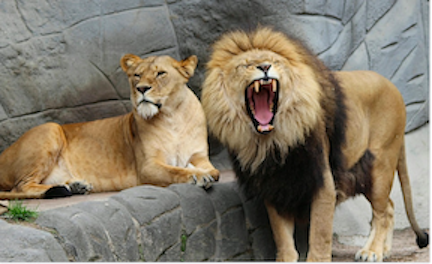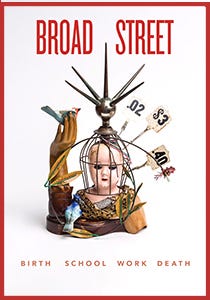“The girl imagines her body losing a dimension, her self as a pocket door.”

This feature is also available, in slightly different format, on Medium.
Panthera leo leo; or, a Civics Lesson
A girl walks down the hallway in junior high wearing stone-washed jeans and a choker, assuming no one will touch her though many will look. As Aristotle writes The lion… progress[es] by an amble; the action so called is when the animal never overpasses the right with the left but always follows close upon it. This may appear artful but isn’t, as a cat traverses the sill of an open window. The middle school has no walls, just folding accordion slats to divide classrooms into four blocks — genera — named for the colors of the school and its mascot. Gold Block. Black Block. The girl imagines her body losing a dimension, her self as a pocket door. A way to evade the predatory place altogether.
Aristotle’s History of Animals is thorough; at times it is accidentally funny, as when he writes Hedgehogs copulate erect, belly to belly or that lions don’t have under-eyelashes and piss backwards. Other times Aristotle states the obvious — e.g., Furthermore, of animals some are horned and some are not so. Here perhaps he is being pessimistic, assuming the horned / unhorned animals are temporary and so necessitate description, as the banal is transformed by annihilation into the marvelous. In which case he would be simultaneously hubristic, assuming his account will survive the extinction of the thing itself, or that he would be the only one to record.
Most likely Aristotle’s tone reveals affectation of style, not spirit. Perhaps he was so entranced with the act of description that we as readers are swept out into the sea of his mind, as when a magician pulls a tablecloth from the table, leaving behind the objects still in their place.
___
Spring afternoons the yellow buses line the cul-de-sac looking mean-spirited and institutional. White dogwood blooms shed onto the steps at the school entrance. I hate them: the moment they bloom, the boys start joking that they smell just like pussy.
That spring a girl has a seizure in our biology class, thrashes about on the floor like a fish on the speckled deck of a boat. The teacher kneels down and removes the girl’s shoes, inexplicably. We’d been watching a film projected onto the gray cinderblock wall, about extinction; a recorded man’s voice explains it as a process nearly done and nearly undone, many times over.The last wild Atlas lion was killed by a French colonial hunter in 1922 in Morocco on Atlas mountain — that is, a mountain bearing the lion’s own name. Cut to grainy shot of heavy lion head, grasped by the mane by a grinning man with a predictably wide stance. The voiceover adds with anemic wit: The history books may have left a chapter or two out of the story.
Later that day one of the boys — maybe emboldened by the sight of the epileptic girl in a moment of biological abandon — grabs my friend by the dogwood and shoves her against a wall. He bares his teeth at her, says Ooh. Ooh I like that.
___
Extinction is a very old book, sliced open and re-sealed over and over. In writing a report on extinction one must note the multiple names used for a single species: for instance, the Atlas lion may be referred to as the Barbary lion, Moroccan Royal lion, or Panthera leo leo. You must record the killings of all three to know whether the species is truly, as they say, a goner.
Extinction is a symphony of killings in different time signatures. In the Roman Empire the state imported Barbary lions from North Africa for gladiator games and baiting, where a lion battles a pack of dogs, encircled by drunk human spectators. Lion baiting was a blood sport with a long run: King James I of England kept his lions in the Tower, a floor above the traitors and heretics, because it was fun to watch lions tear apart dogs like toys, or at least as fun as sitting around identifying witches, his other pastime. But he let his polar bear amble into the Thames on a long silver chain to hunt for fish all on its own.
Sometimes I think of naming as a paternal act: Adam sits, petting his little zoo. Other times I think it is a statement of disbelief, a lack of faith; a worry that if we don’t have a word for something, it won’t let us hold it anymore.
___
Journalism. Fourth period. I sit at my green melamine desk and record the objects in the room: “The yellow ribbed border paper is torn slightly in the left corner. Below it is a faint chalk mark, roughly an inch in length,” etc. I do not write about Shelley, her satin jacket, skunk mane of black hair, and thin black eyeliner, who has threatened to beat my ass at the trailer park across the street after school any day now. I do not write about the baseball-hat-wearing Christian girl who was my science partner and who recently shot herself, and do not write that I think it was because she loved girls or wanted to be a boy or both, I’m not sure. Nor do I write about the pockmarked Civics teacher who invites me to sit on his lap or to swim with him after school and counts aloud the days until his retirement at the start of each class.
Anyhow, description can be — not involve but itself be — accident or strategy. You can use it when you’re afraid or a little bit drunk, say, at a party. More naming means more strategy, more accidents: baiting. Gold Block. Partner.
I wonder where Shelley is now. She lives in my brain and sparkles with her violence.
___
Critical Thinking, first period, 1993. In an open square space with plastic accordion walls the color of almonds, we sit for a fifty-minute class. I sit near my friend who has gap-teeth and reddish blond hair that makes her look a little wild and feline though she’s no lion, just a breeze.
The teacher — male, early thirties — makes frequent use of an overhead projector. In a lesson on criteria he uses a special red pen to outline qualities of the Perfect Woman: a) green eyes b) blond hair and c) a curvaceous body weighing appx. 105 to 110 pounds. I know what curvaceous means but some don’t, so he adds in red marker Big Breasts, Backside, then has us look it up in a dictionary anyway. Finally, he demonstrates the limitations of criteria in critical thinking by explaining how a curvaceous waitress infected him with a painful sexually transmitted disease.
With these examples he uses his young man’s hands to wrap up us girls and place us outside the beige slatted city walls. We know what is happening. We wait there by the gate, looking at our clawed feet.
___
Aristotle says, Many animals have memory, and are capable of instruction; but no other creature except man can recall the past at will.
Aristotle says:
A) Man is by nature a political animal.
B) What separates humans from animals is rationality.
C) The city is a machine.
D) Machine.
Aristotle says the city is organic, which is like saying cruelty is organic. Or rather, it is like saying division of resources and power is organic, which is like saying cruelty is organic.
Erasing takes a long time: the rain of pink rubber shreds, the rubbery smell of it. The girl writes in her notebook: Miss Royal Leo, Leo Royal Atlas, drawing a lion with hearts for eyes, listing her favorite things about lions and gladiators.
She has been here a long time. Her position continues to be imperfect.

*********************************************************

Alison Powell’s book of poetry, On the Desire to Levitate, won the Hollis Summers Poetry Prize and was published by Ohio University Press in 2014. Her lyric essays have recently appeared or are forthcoming in A Public Space, Black Warrior Review, Hayden’s Ferry Review, Sonora Review, and Proximity Magazine, where her essay “Already We Are Less Than Ever Before” was selected by Hanif Abdurraqib for the 2019 Personal Essay Prize. Recent poetry can be found in Copper Nickel, Prairie Schooner, Boston Review, and more.









